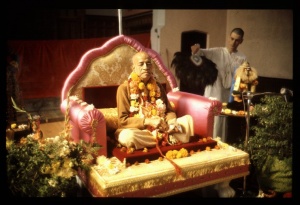CC Antya 7.145 (1975)

A.C. Bhaktivedanta Swami Prabhupada
Below is the 1996 edition text, ready to be substituted with the 1975 one using the compile form.
TEXT 145
- tāṅra praṇaya-roṣa dekhite prabhura icchā haya
- aiśvarya-jñāne tāṅra roṣa nāhi upajaya
SYNONYMS
tāṅra—his; praṇaya-roṣa—affectionate anger; dekhite—to see; prabhura—of Śrī Caitanya Mahāprabhu; icchā haya—there is a desire; aiśvarya-jñāne—due to knowledge of opulences; tāṅra—his; roṣa—anger; nāhi—not; upajaya—is awakened.
TRANSLATION
Lord Śrī Caitanya Mahāprabhu sometimes desired to see Gadādhara Paṇḍita’s affectionate anger, but because of his knowledge of the Lord’s opulences, his anger was never invoked.
PURPORT
Joking with Rukmiṇīdevī in Dvārakā, Kṛṣṇa once advised her to accept another husband because He was unfit for her. Rukmiṇīdevī, however, unable to understand His joking words, took them very seriously and immediately fell to the ground in fear of separation from Him. In the pastimes of Lord Śrī Caitanya Mahāprabhu, Jagadānanda Paṇḍita was always in disagreement with the Lord like Satyabhāmā, whereas Gadādhara Paṇḍita was always awed by the Lord’s opulence and was therefore submissive to the Lord under all circumstances.